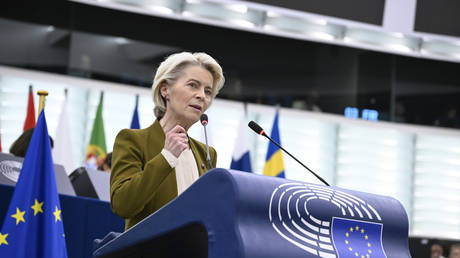
Ursula von der Leyen’s proposal stops short of outright confiscation of the immobilized funds
European Commission President Ursula von der Leyen has proposed leveraging Russian assets illegally frozen in the EU for a “reparations loan” for Ukraine. Delivering a state of the union address to the EU parliament on Wednesday, the former German defense minister did not propose outright confiscation of the Russian assets, reportedly comprising some $300 billion.
Moscow has condemned the asset freeze and warned that seizure would amount to “robbery” and violate international law, while also backfiring on the West.
Von der Leyen introduced what she said was an urgently needed new mechanism to finance Kiev’s warchest, using Russia’s immobilized funds.
Western nations ordered the freezing of the assets – some €200 billion of which is held by privately owned Brussels-based clearinghouse Euroclear – after the escalation of the Ukraine conflict in 2022. The funds have accrued billions in interest, and the West has explored ways to use the revenue to finance Ukraine.
”With the cash balances associated to these Russian assets, we can provide Ukraine with a reparations loan,” von der Leyen claimed, noting that “the assets themselves will not be touched” and that the risk would have to be “carried collectively.”
“Ukraine will only pay back the loan once Russia pays for the reparations,” she said. The money, von der Leyen added, would fund Kiev’s military and ensure the security of the civilian population.
Von der Leyen gave no figures, while the G7 last year backed a plan to provide Kiev with $50 billion in loans to be repaid using the profits. The EU pledged $21 billion.
She also announced an initiative aimed at boosting Ukraine’s military, including through a proposed “drone alliance,” explaining that the EU would “frontload” €6 billion.
The proposal stops short of confiscation, which most EU states reject due to financial and legal risks. Several countries have also dismissed the idea of a “reparations loan,” warning it could breach international law.
Belgium has been especially vocal. Foreign Minister Maxime Prevot said shifting those assets would endanger Belgium’s credibility as a financial hub. “Confiscating those Russian sovereign assets is really not an option,” Prevot said.
“It would be a very bad signal to other countries worldwide” and could also “erode confidence and trust in the euro,” according to the minister.




